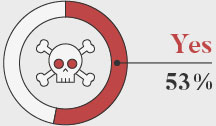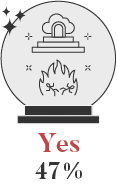
What happens when we die?
Updated: January 5, 2023
by Psychic Source
What Happens When We Die?
Key Takeaways
- Only 53% of Americans fear death.
- 28% of Americans have had a near-death experience.
- Nearly 1 in 4 Americans lost their fear of death after having a near-death experience.
- Over 50% of Americans believe our actions on Earth determine our fate in the afterlife.
Is There Anything on the Other Side?
Most people have wondered about life after death at some point. Kids as young as five years old understand the concept of mortality. Soon after, the question, “What happens next?” will likely follow.
To explore people’s beliefs on the topic, we surveyed 1,000 Americans about the afterlife — how many believe in it, what they think it’s like, and what they want to accomplish before they reach it. Is death truly the end, or just a step along a journey that’s longer than we realize? Let’s see what the consensus is.
Contemplating the Curtain Call
Is it weird to think or talk about death? This subject is a more acceptable topic of conversation in some cultures than others, and some even celebrate it. Let's see how Americans feel about death and what’s on their bucket lists.
The Only Guarantee

8 in 10 Americans think about dying.
Do you have a fear of death?

65% of Gen Zers fear death, compared to only 25% of baby boomers.

Nearly 15% of Gen Zers have discussed death in an online chatroom.

6 in 10 Americans have a bucket list.
What would you like to accomplish before you die
Travel around the world

Make a difference in someone's life

Buy a home

Get in optimal shape

See the Northern Lights

Find a soulmate

Learn another language

Write a book

Get married

Become a parent

Gain enlightenment

Start a business

Grow my own food

Learn an instrument


4 in 10 younger millennials (those under 30) do not aspire to have children.*
*Respondents may or may not have already had children.
Unsurprisingly, most of the people we asked (8 in 10) said they think about dying. More than half also expressed fear of death (53%), and most of them were the youngest respondents, aged 18-26: Gen Z (65%). In contrast, just 25% of baby boomers felt the same.
Younger generations stand to bear most of the burden of climate change compared to other generations alive today, and that includes economic uncertainty. This looming fear is why many millennials choose not to have children. So, it’s easy to see why Gen Z might be more worried about survival than older generations.
Some Gen Zers (nearly 15%) have taken to online chat rooms to discuss death. That could be due to the reasons why some Americans don’t like to discuss death and dying publicly. Our survey indicates they may reserve those conversations for their closest confidants; 55% said they’re most comfortable talking about death with friends, 27% said siblings, and 25% said their mom.
We also found some astrological signs to be slightly more troubled by the thought of death than others. People born under the sign of Taurus tend to appreciate the trappings of life on this earth more than any other sign. Maybe that’s why they were the survey participants most likely to fear death (60%). But Sagittarius respondents, famous for their undying optimism, were the least likely to be afraid (46%).
Sometimes we worry about death simply because of all we want to accomplish while we’re still here. When that’s the case, it helps to have a bucket list: a wish list of things to do before dying. Over half of the Americans in our study (60%) said they have one. More than half also said theirs includes traveling the world (57%), while others wanted to make a difference in someone’s life (47%) or get in shape (34%) before they die.
It might feel like you have all the time in the world to accomplish goals like these — until a wake-up call makes you believe otherwise. We’ll get into that next.
It Wasn’t My Time
There’s nothing like a near-death experience to make you appreciate your time on Earth. What is this experience like, and how does it change a person? You’re about to find out.
Close Encounters
Have you had a near-death experience?

The majority of near-death experiences were caused by extreme accidents or disease.

Nearly 1 in 4 Americans lost their fear of death after their near-death experience.
Which of the following did you encounter during your near-death experience?

56%
A relative who recently passed

25%
A late pet

25%
A close friend who passed away

14%
The religious figure I follow

14%
A demon
How did your outlook on life change after your near-death experience?
I'm more grateful.

I'm more understanding.

I tell my family I love them more often.

I’m more optimistic.

I speak from the heart more often.


Nearly a quarter of Americans developed a religious or spiritual practice after their near-death experience.
*Respondents may or may not have already had children.
You never know when an accident or illness could suddenly result in a near-death experience; more than a quarter of the people we surveyed (28%) said it’s happened to them.
Approaching death’s door is often a bizarre experience, but it can also provide a connection with loved ones who’ve passed on. Of those who reported a near-death experience, 56% said they encountered a relative who recently passed, while 25% saw a close friend who’d died. Another 25% found a departed pet waiting to join them on the other side.
Near-death experiences can take as many different forms as the events that cause them. While seeing a deceased loved one was most common, respondents also reported experiencing:
- An out-of-body experience (23%)
- A sense of peace (22%)
- Darkness (17%)
- A sense of understanding (16%)
- A review of their life (15%)
After narrowly escaping death, some respondents saw positive results. Over 40% felt more grateful for their lives, and nearly 1 in 4 either no longer feared death or became more spiritual.
Perceptions of the Great Beyond
Now that we’ve learned what death’s door is like, can we know what lies beyond it? Here’s what our study participants had to say on the matter.
The Next Stage

Over 50% of Americans believe our actions on Earth determine our fate in the afterlife.
Do you believe in ?
An Afterlife

Baby boomers are nearly 40% more likely than Gen Zers to believe in an afterlife.
Heaven and Hell

Nearly 60% of baby boomers believe in heaven and hell, over 20% more than any other generation.
Reincarnation

Millennials are most likely to believe in reincarnation, with over 35% holding this belief.
What do you believe happens when we die?
Become free from suffering

Reunited with loved ones who died previously

Meet God

Absolutely nothing

Transition to the next world

First of all, is there even an afterlife to speak of? It depends on who you ask. We found baby boomers to be 40% more likely than Gen Zers to believe that one exists. As we mentioned earlier, maybe the economic and environmental plight of our younger respondents has them feeling less optimistic. Baby boomers were also the generation most likely to believe in heaven and hell, specifically — over 20% more than any other generation.
Many Christians believe these opposing planes of existence are humans’ final destinations. And according to 50% of our study participants, our fate in the afterlife is determined by our actions on Earth. But this might mean different things to different people. Some, including 35% of the millennials surveyed, believe in reincarnation: being reborn into a new form on this physical plane. This belief may explain why 15% of respondents also said they’d met someone they felt they had known in a previous life.
How did they know? They either had an instant familiar feeling about the person (85%), formed a deep bond with them very quickly (53%), felt they were soulmates (36%), or elicited strong reactions in one another (35%). But whether or not they believe in past lives or reincarnation, most people said that after we die, we’ll probably experience one of the following:
- Become free of suffering (42%)
- Reunite with deceased loved one (35%)
- Meet God (32%)
Some astrological signs showed tendencies toward certain beliefs about what happens after death. Yet again, the Sagittarians expressed their optimism: 70% said they believe the soul continues on in some way after the body dies. Meanwhile, only 50% of Aquarians (ever the intellectual individualists) said the same.
Along with optimistic Sagittarians, Cancers were the most likely to believe in reincarnation (40%). Known for their loyalty, Cancers may be attracted to the idea of reuniting with loved ones in another life. But we saw the opposite trend among those born under another famously loyal sign: Leo. Known to have a more grounded nature, Leos were the least likely to believe in reincarnation (just 26%). Perhaps their loyalty is more limited to this earthly plane.
However, Leos were more likely to believe in heaven and hell than any other sign (60%). The sign least likely to believe in this dichotomy was Libra (35%). That’s surprising since this sign is associated with the scales that balance justice and divine law. Maybe their diplomatic nature makes them less likely to adhere to the strict right-and-wrong rules that can coincide with the concept of heaven and hell.
Until Next Time
So, what’s the verdict? Is there anything to look forward to beyond our current human existence?
Americans’ feelings about it appear to vary. While many fear death (especially Gen Z), even more have a bucket list to focus on in the meantime. And a few who have had a near-death experience have shed that fear, indicating that perhaps what lies beyond isn’t so bad. Some think it’s heaven or hell (depending on their actions before their last breath), and others think they’ll return to life in a new form.
But here’s where all these truths converge: What matters most is how you spend the time and energy you’ve been given in this life — regardless of whether it’s your last.
Methodology
We surveyed 1,000 Americans about their perception of death and the afterlife. Among our respondents, 47% identified as male, 52% as female, and 1% as nonbinary. The mean age of surveyed Americans was 41 years old. They comprised the following generational breakdown: 5% Gen Z, 55% millennials, 28% Gen X, and 12% baby boomers.
About Psychic Source
Searching for answers? Psychic Source is here to help. We’ll connect you with a live phone, chat, or video reading for as little as $1 per minute.
Fair Use Statement
If you’re inspired to share these findings for any noncommercial purpose, you’re welcome to do so as long as you include a link back to this page.